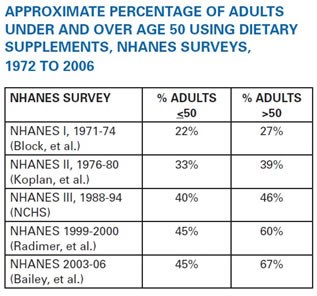Multivitamins
March 25th, 2013
Make Sure You Get All the Basics....
Eating on the run and coping with the stressors of today’s fast paced lifestyles can make it difficult to get all the nutrients you need. Vitamins and minerals play an important role in many biological processes such as metabolism, immunity and enzyme function, and provide nourishment to the body’s various tissues and organs. Sufficient intake of essential vitamins and minerals is therefore crucial for maintaining overall health and wellbeing. Today over 50% of adults use dietary supplements and this number is increasing. In fact, supplement use has grown over the past 40 years among Americans as shown by the study below;

Source: Council for Responsible Nutrition
The researchers concluded that those who took supplements reported motivations related to overall health more commonly than for supplementing nutrients from food intakes. The use of supplements was related to more favorable health and lifestyle choices.
So the question asked by consumers, how much and do we need to supplement with multivitamins?
According to research studies on multivitamins, the results are somewhat mixed, depending upon the details of how such studies are conducted. Before making any conclusions, I advise you to take a look at all the variables. For example, what vitamins and dosages in which populations with what health conditions must be ascertained, before we draw conclusions as to any health benefits for those who take supplements?
From clinical evidence experienced the best current recommendation is to have a well-rounded diet with sufficient fruits and vegetables, which should be able to provide most people with all the micronutrients required to prevent diseases. However, in today’s hectic society, individuals may not be receiving all the nutrients they need from the foods they eat. Poor dietary habits such as skipping meals, over consumption of processed foods, alcohol and caffeine, along with environmental stress can compromise nutritional status. Further, as we age, some nutrients are absorbed less efficiently and thus are required in greater amounts.
Every individual has unique nutritional needs based on age, body composition, stress, activity level and lifestyle habits. Therefore, a high-quality formulation with the right amount of ingredients is key. Since nutrients work synergistically, enhancing the absorption of one another, the proper balance of vitamins and minerals is necessary for effective functioning.
Antioxidants are also part of that delicate balance. Smog, tobacco smoke and automobile exhaust are just some of the many environmental pollutants that we are exposed to on a daily basis. These harmful substances can build up in the body and form unstable molecules called free radicals. Free radicals can easily bind with other molecules or atoms causing chemical reactions in the body. We need free radicals to produce energy and certain substances that the body requires, however excessive free radical formation can have detrimental effects on our cells and tissues, eventually destroying them. Furthermore, excessive amounts of free radicals in the body have been linked to major chronic diseases such as cataracts, premature aging, cancer, coronary heart disease and other degenerative diseases.
Certain enzymes in the body act as “free radical scavengers” that neutralize these unstable molecules making them no longer harmful. Besides the body’s natural defense, certain vitamins and minerals called antioxidants also help to protect the body against the formation of free radicals. Many antioxidants can be obtained from foods that we eat especially fresh fruit and vegetables; however it’s difficult to get enough to fight off the many free radicals generated in our polluted environment. Taking a multivitamin high in antioxidants will help to detoxify and protect the body against the damaging effects of free radicals.
In multivitamins, vitamin A, C and E are excellent antioxidants. In addition, selenium and chromium are minerals which are antioxidants. Today vitamins have a deserved reputation for being an important part of overall health and used for maintenance for optimum health. Regardless of the cause, the general feeling is that vitamins are all good since it helps relieve stress and enhance energy due in part to the antioxidants. There are many situations whereby supplementation is evidence-based and appropriate. There is increasing evidence to support the use of vitamin D supplementation for many populations. Many elderly have borderline or low B12 levels, which correlates with dementia. Pregnant women should take prenatal vitamins high in folic acid along with B12 and Iron.
I recommend other suggestions we can do to maintain a healthy lifestyle. These include exercise, which helps to decrease stress and increase cardiovascular circulation, reduce the amount of refined sugar, alcohol and caffeine in our diet, and increase the amount of fresh fruits and vegetables. My advice is to find out which supplement is required depending on your diet and lifestyle and recommendations should be based upon specific health conditions and blood tests to measure levels of vitamins, so that specific deficiencies can be appropriately targeted.
| Antioxidants | Food sources / active ingredients |
| Canadian Pine Bark | Proanthocyanidins |
| Flavonoids | Anthocyanins in blueberries |
| Carotenoids | Lycopene in tomatoes and lutein in kale, beta-carotene in carrots |
| Quercetin | Apples and onions |
| Catechins | Green tea |
| Isoflavones | Soy, (genistein and daidzein) |
| Rosehips | Citric acid, pectins, flavonoids, vitamin C |
| Zinc, selenium | Oysters, Brazil nuts, white meats, pumpkin seeds |
| Vitamins A, C, E | Carrots, green vegetables, liver; Citrus fruits, peach, black currents, kiwi; seeds, nuts spinach, wheat germ oil |
References:
Bailey R.L. Why US Adults Use Dietary Supplements Why US Adults Use Dietary Supplements, JAMA Internal Medicine, 1. DOI: 10.1001/jamainternmed.2013.2299
Blendon R.J. (2013). Users’ Views of Dietary Supplements, JAMA Internal Medicine, 173 (1) 74. DOI: 10.1001/2013.jamainternmed.311
Carvey C.E.,Farina E.K. & Lieberman H.R. (2012). Confidence in the efficacy and safety of dietary supplements among United States active duty army personnel, BMC Complementary and Alternative Medicine, 12 (1) 182. DOI: 10.1186/1472-6882-12-182
Gaziano, J.M., et al., Multivitamins in the Prevention of Cancer in Men The Physicians' Health Study II Randomized Controlled Trial. JAMA, November 14, 2012, Vol 308, No. 18.
Posted April 22, 2013
Posted March 25th, 2013
Posted March 4th, 2013
Posted February 13 2013
IMPORTANT NOTE:
The answers given are not medical advice or advocating specific treatments. You should consult your health care provider about any medical information and before taking natural supplements if you are on prescription drugs.



| North America 1-514-695-2299 / TOLL FREE 1-888-900-2299 | (back to top)▲ |
Designed by theComputerAide.com


